Legislation and Ethics in Travel and Tourism
VerifiedAdded on 2020/12/29
|12
|4205
|70
Homework Assignment
AI Summary
This assignment examines the legal and ethical framework of the travel and tourism sector, focusing on the case of Thomas Cook. It analyzes key legislation, including health and safety, equality, and consumer protection, and their impact on the company's operations. The assignment also discusses ethical dilemmas faced by the industry and Thomas Cook's Corporate Social Responsibility (CSR) policies. Desklib provides past papers and solved assignments for students.
Contribute Materials
Your contribution can guide someone’s learning journey. Share your
documents today.
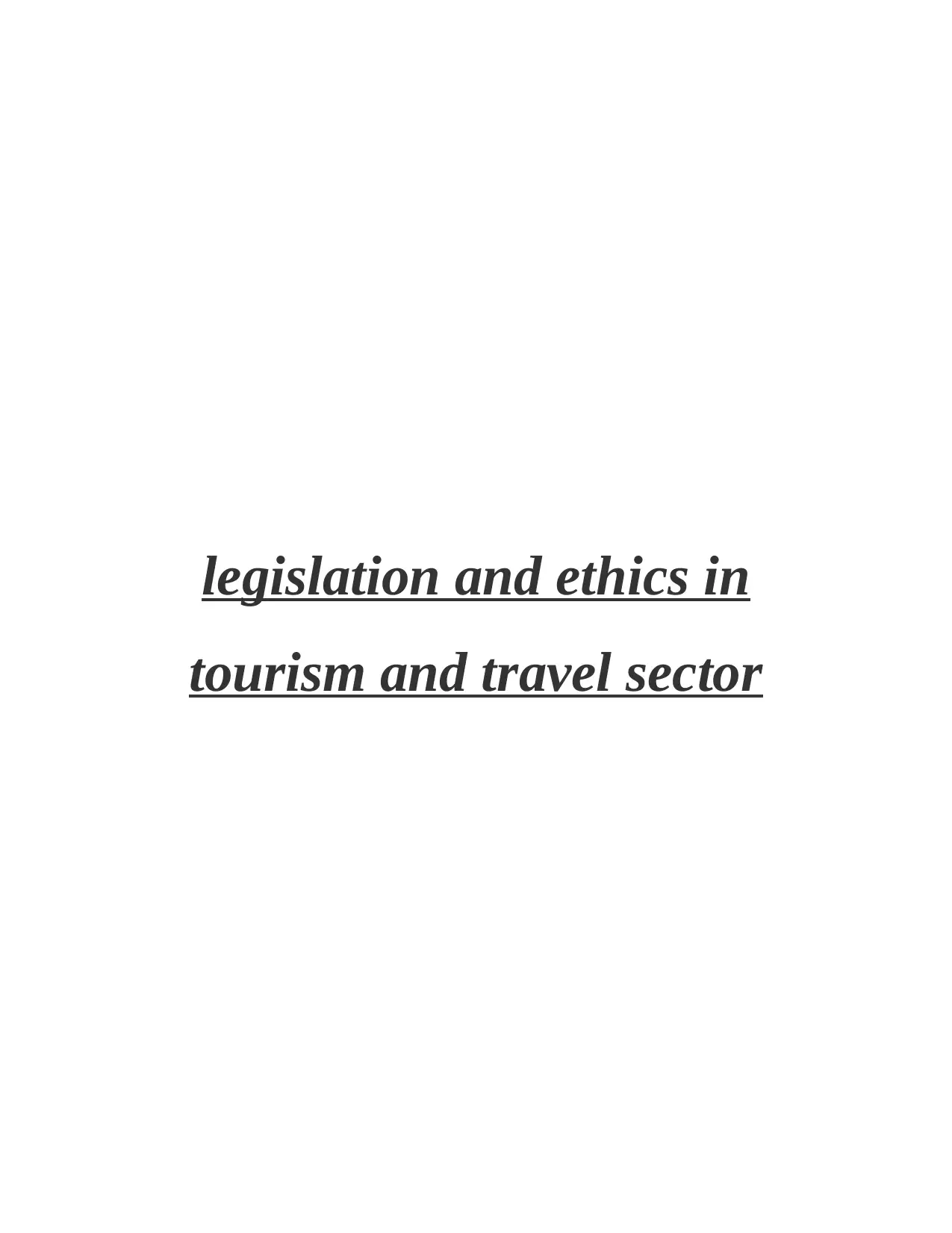
legislation and ethics in
tourism and travel sector
tourism and travel sector
Secure Best Marks with AI Grader
Need help grading? Try our AI Grader for instant feedback on your assignments.
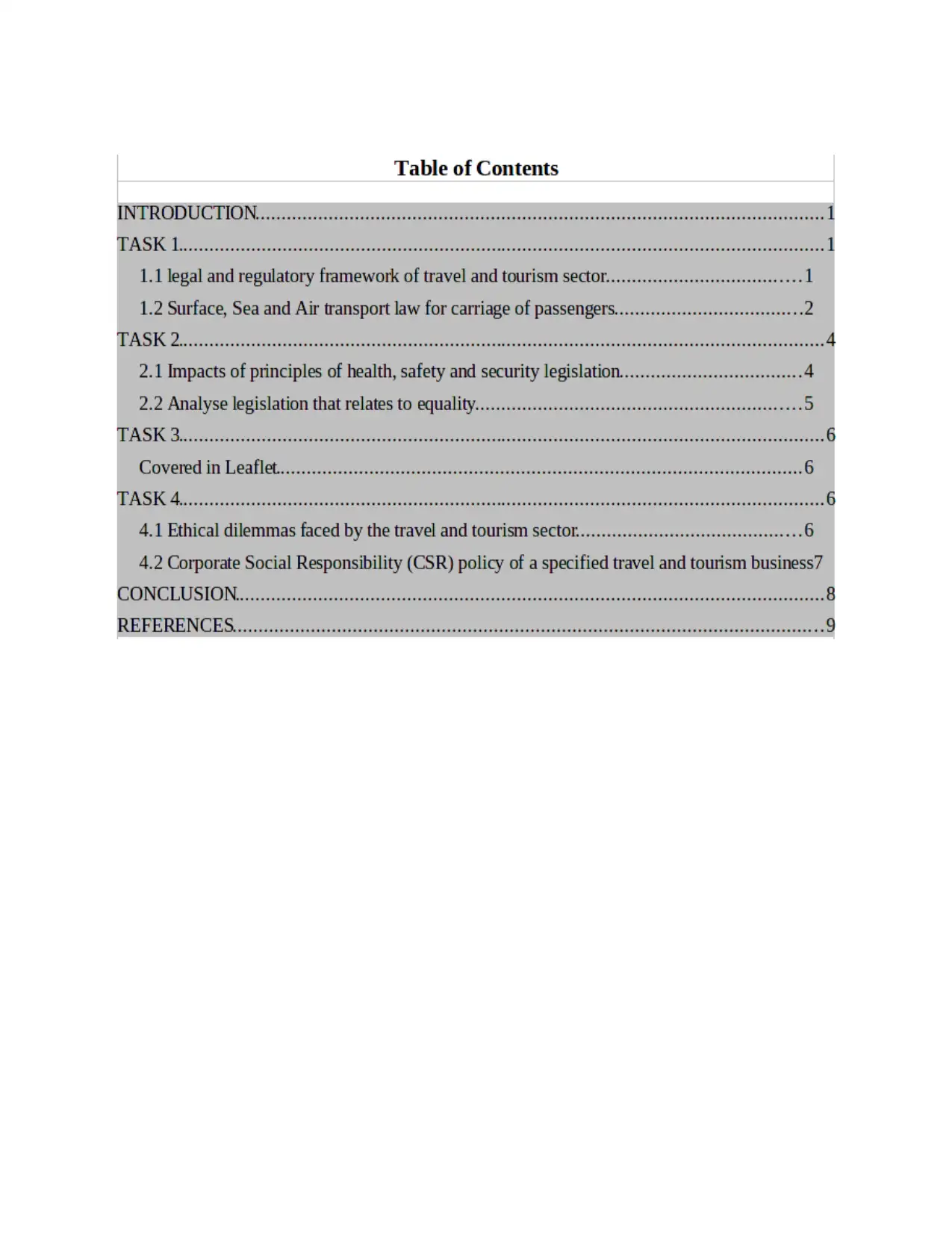
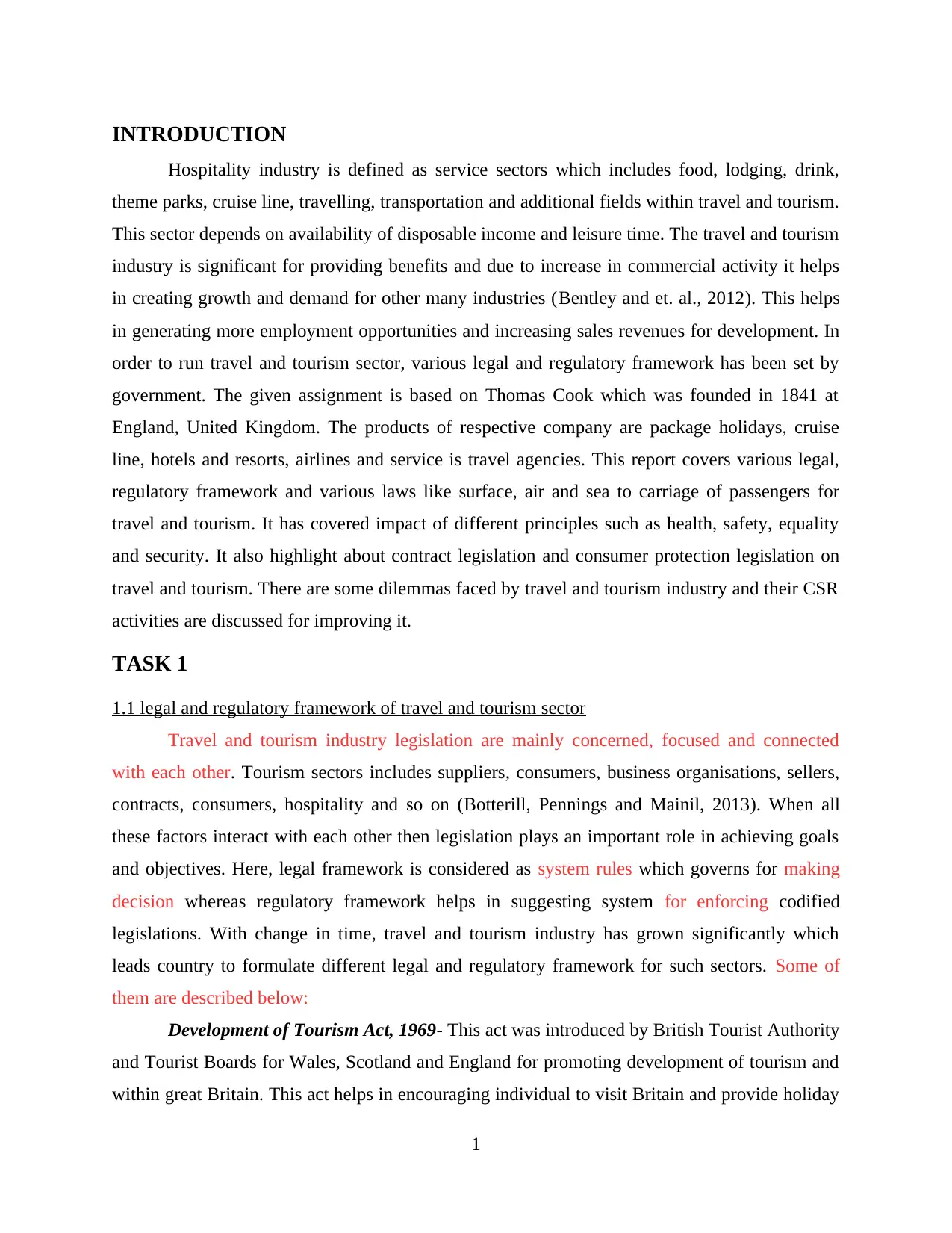
INTRODUCTION
Hospitality industry is defined as service sectors which includes food, lodging, drink,
theme parks, cruise line, travelling, transportation and additional fields within travel and tourism.
This sector depends on availability of disposable income and leisure time. The travel and tourism
industry is significant for providing benefits and due to increase in commercial activity it helps
in creating growth and demand for other many industries (Bentley and et. al., 2012). This helps
in generating more employment opportunities and increasing sales revenues for development. In
order to run travel and tourism sector, various legal and regulatory framework has been set by
government. The given assignment is based on Thomas Cook which was founded in 1841 at
England, United Kingdom. The products of respective company are package holidays, cruise
line, hotels and resorts, airlines and service is travel agencies. This report covers various legal,
regulatory framework and various laws like surface, air and sea to carriage of passengers for
travel and tourism. It has covered impact of different principles such as health, safety, equality
and security. It also highlight about contract legislation and consumer protection legislation on
travel and tourism. There are some dilemmas faced by travel and tourism industry and their CSR
activities are discussed for improving it.
TASK 1
1.1 legal and regulatory framework of travel and tourism sector
Travel and tourism industry legislation are mainly concerned, focused and connected
with each other. Tourism sectors includes suppliers, consumers, business organisations, sellers,
contracts, consumers, hospitality and so on (Botterill, Pennings and Mainil, 2013). When all
these factors interact with each other then legislation plays an important role in achieving goals
and objectives. Here, legal framework is considered as system rules which governs for making
decision whereas regulatory framework helps in suggesting system for enforcing codified
legislations. With change in time, travel and tourism industry has grown significantly which
leads country to formulate different legal and regulatory framework for such sectors. Some of
them are described below:
Development of Tourism Act, 1969- This act was introduced by British Tourist Authority
and Tourist Boards for Wales, Scotland and England for promoting development of tourism and
within great Britain. This act helps in encouraging individual to visit Britain and provide holiday
1
Hospitality industry is defined as service sectors which includes food, lodging, drink,
theme parks, cruise line, travelling, transportation and additional fields within travel and tourism.
This sector depends on availability of disposable income and leisure time. The travel and tourism
industry is significant for providing benefits and due to increase in commercial activity it helps
in creating growth and demand for other many industries (Bentley and et. al., 2012). This helps
in generating more employment opportunities and increasing sales revenues for development. In
order to run travel and tourism sector, various legal and regulatory framework has been set by
government. The given assignment is based on Thomas Cook which was founded in 1841 at
England, United Kingdom. The products of respective company are package holidays, cruise
line, hotels and resorts, airlines and service is travel agencies. This report covers various legal,
regulatory framework and various laws like surface, air and sea to carriage of passengers for
travel and tourism. It has covered impact of different principles such as health, safety, equality
and security. It also highlight about contract legislation and consumer protection legislation on
travel and tourism. There are some dilemmas faced by travel and tourism industry and their CSR
activities are discussed for improving it.
TASK 1
1.1 legal and regulatory framework of travel and tourism sector
Travel and tourism industry legislation are mainly concerned, focused and connected
with each other. Tourism sectors includes suppliers, consumers, business organisations, sellers,
contracts, consumers, hospitality and so on (Botterill, Pennings and Mainil, 2013). When all
these factors interact with each other then legislation plays an important role in achieving goals
and objectives. Here, legal framework is considered as system rules which governs for making
decision whereas regulatory framework helps in suggesting system for enforcing codified
legislations. With change in time, travel and tourism industry has grown significantly which
leads country to formulate different legal and regulatory framework for such sectors. Some of
them are described below:
Development of Tourism Act, 1969- This act was introduced by British Tourist Authority
and Tourist Boards for Wales, Scotland and England for promoting development of tourism and
within great Britain. This act helps in encouraging individual to visit Britain and provide holiday
1
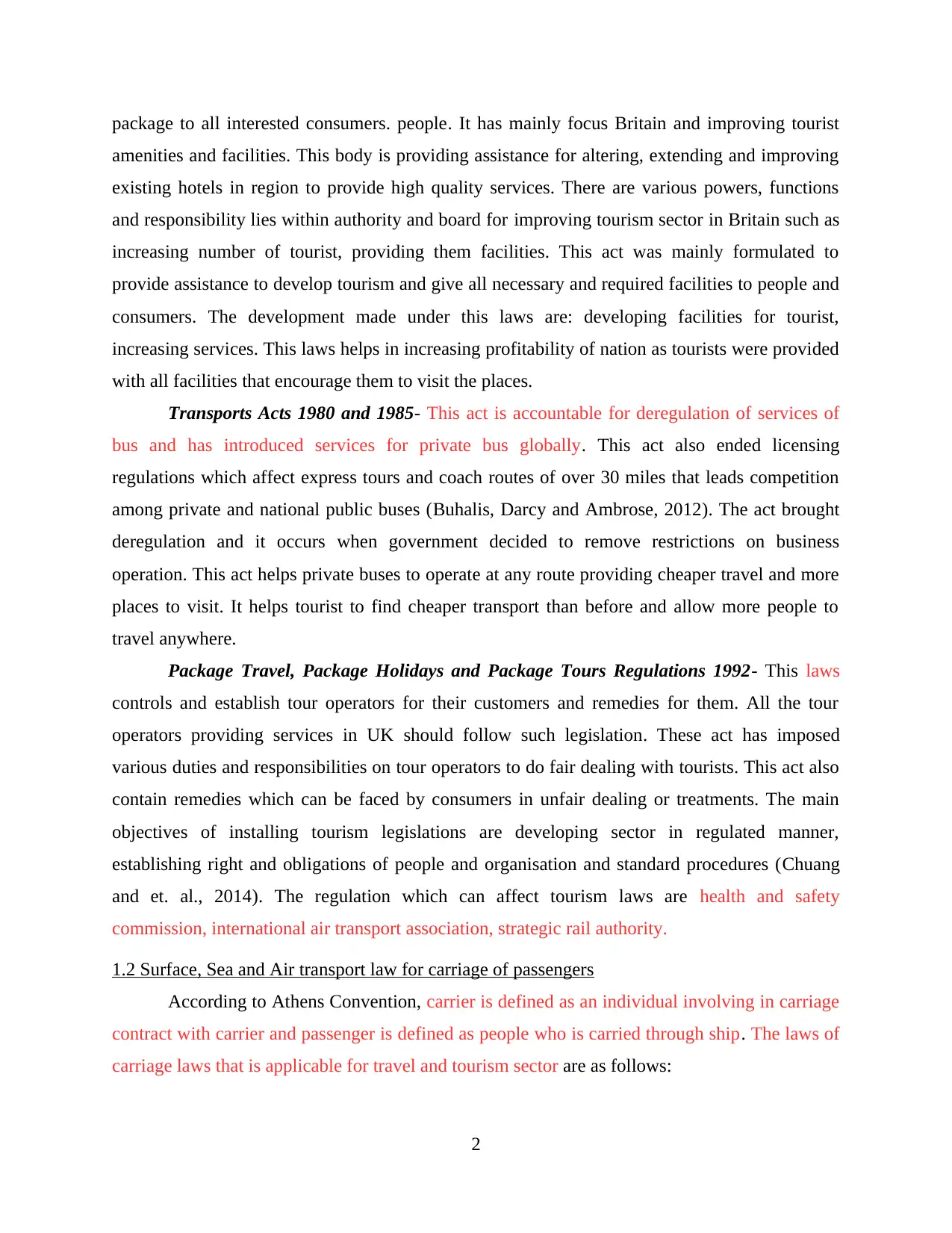
package to all interested consumers. people. It has mainly focus Britain and improving tourist
amenities and facilities. This body is providing assistance for altering, extending and improving
existing hotels in region to provide high quality services. There are various powers, functions
and responsibility lies within authority and board for improving tourism sector in Britain such as
increasing number of tourist, providing them facilities. This act was mainly formulated to
provide assistance to develop tourism and give all necessary and required facilities to people and
consumers. The development made under this laws are: developing facilities for tourist,
increasing services. This laws helps in increasing profitability of nation as tourists were provided
with all facilities that encourage them to visit the places.
Transports Acts 1980 and 1985- This act is accountable for deregulation of services of
bus and has introduced services for private bus globally. This act also ended licensing
regulations which affect express tours and coach routes of over 30 miles that leads competition
among private and national public buses (Buhalis, Darcy and Ambrose, 2012). The act brought
deregulation and it occurs when government decided to remove restrictions on business
operation. This act helps private buses to operate at any route providing cheaper travel and more
places to visit. It helps tourist to find cheaper transport than before and allow more people to
travel anywhere.
Package Travel, Package Holidays and Package Tours Regulations 1992- This laws
controls and establish tour operators for their customers and remedies for them. All the tour
operators providing services in UK should follow such legislation. These act has imposed
various duties and responsibilities on tour operators to do fair dealing with tourists. This act also
contain remedies which can be faced by consumers in unfair dealing or treatments. The main
objectives of installing tourism legislations are developing sector in regulated manner,
establishing right and obligations of people and organisation and standard procedures (Chuang
and et. al., 2014). The regulation which can affect tourism laws are health and safety
commission, international air transport association, strategic rail authority.
1.2 Surface, Sea and Air transport law for carriage of passengers
According to Athens Convention, carrier is defined as an individual involving in carriage
contract with carrier and passenger is defined as people who is carried through ship. The laws of
carriage laws that is applicable for travel and tourism sector are as follows:
2
amenities and facilities. This body is providing assistance for altering, extending and improving
existing hotels in region to provide high quality services. There are various powers, functions
and responsibility lies within authority and board for improving tourism sector in Britain such as
increasing number of tourist, providing them facilities. This act was mainly formulated to
provide assistance to develop tourism and give all necessary and required facilities to people and
consumers. The development made under this laws are: developing facilities for tourist,
increasing services. This laws helps in increasing profitability of nation as tourists were provided
with all facilities that encourage them to visit the places.
Transports Acts 1980 and 1985- This act is accountable for deregulation of services of
bus and has introduced services for private bus globally. This act also ended licensing
regulations which affect express tours and coach routes of over 30 miles that leads competition
among private and national public buses (Buhalis, Darcy and Ambrose, 2012). The act brought
deregulation and it occurs when government decided to remove restrictions on business
operation. This act helps private buses to operate at any route providing cheaper travel and more
places to visit. It helps tourist to find cheaper transport than before and allow more people to
travel anywhere.
Package Travel, Package Holidays and Package Tours Regulations 1992- This laws
controls and establish tour operators for their customers and remedies for them. All the tour
operators providing services in UK should follow such legislation. These act has imposed
various duties and responsibilities on tour operators to do fair dealing with tourists. This act also
contain remedies which can be faced by consumers in unfair dealing or treatments. The main
objectives of installing tourism legislations are developing sector in regulated manner,
establishing right and obligations of people and organisation and standard procedures (Chuang
and et. al., 2014). The regulation which can affect tourism laws are health and safety
commission, international air transport association, strategic rail authority.
1.2 Surface, Sea and Air transport law for carriage of passengers
According to Athens Convention, carrier is defined as an individual involving in carriage
contract with carrier and passenger is defined as people who is carried through ship. The laws of
carriage laws that is applicable for travel and tourism sector are as follows:
2
Paraphrase This Document
Need a fresh take? Get an instant paraphrase of this document with our AI Paraphraser
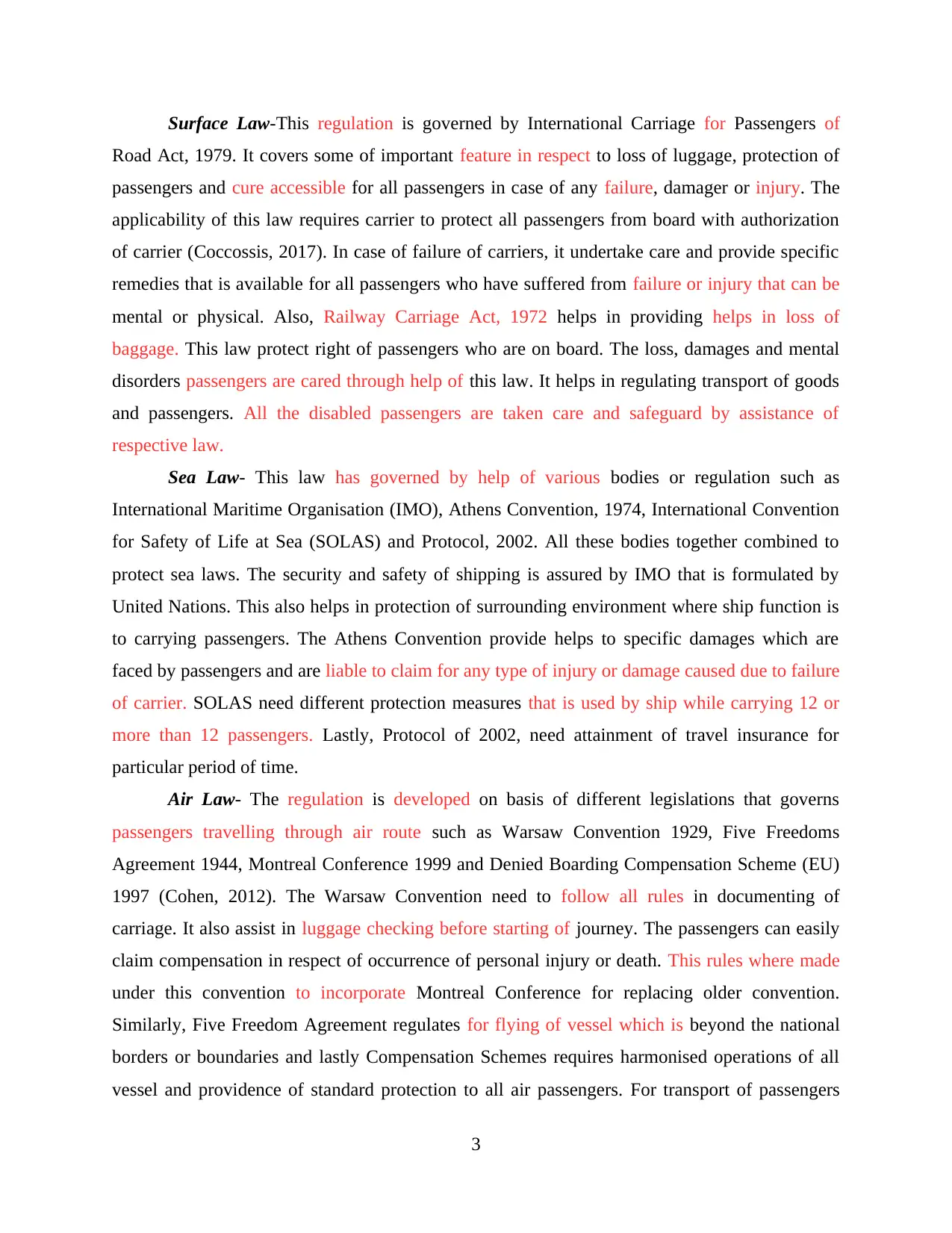
Surface Law-This regulation is governed by International Carriage for Passengers of
Road Act, 1979. It covers some of important feature in respect to loss of luggage, protection of
passengers and cure accessible for all passengers in case of any failure, damager or injury. The
applicability of this law requires carrier to protect all passengers from board with authorization
of carrier (Coccossis, 2017). In case of failure of carriers, it undertake care and provide specific
remedies that is available for all passengers who have suffered from failure or injury that can be
mental or physical. Also, Railway Carriage Act, 1972 helps in providing helps in loss of
baggage. This law protect right of passengers who are on board. The loss, damages and mental
disorders passengers are cared through help of this law. It helps in regulating transport of goods
and passengers. All the disabled passengers are taken care and safeguard by assistance of
respective law.
Sea Law- This law has governed by help of various bodies or regulation such as
International Maritime Organisation (IMO), Athens Convention, 1974, International Convention
for Safety of Life at Sea (SOLAS) and Protocol, 2002. All these bodies together combined to
protect sea laws. The security and safety of shipping is assured by IMO that is formulated by
United Nations. This also helps in protection of surrounding environment where ship function is
to carrying passengers. The Athens Convention provide helps to specific damages which are
faced by passengers and are liable to claim for any type of injury or damage caused due to failure
of carrier. SOLAS need different protection measures that is used by ship while carrying 12 or
more than 12 passengers. Lastly, Protocol of 2002, need attainment of travel insurance for
particular period of time.
Air Law- The regulation is developed on basis of different legislations that governs
passengers travelling through air route such as Warsaw Convention 1929, Five Freedoms
Agreement 1944, Montreal Conference 1999 and Denied Boarding Compensation Scheme (EU)
1997 (Cohen, 2012). The Warsaw Convention need to follow all rules in documenting of
carriage. It also assist in luggage checking before starting of journey. The passengers can easily
claim compensation in respect of occurrence of personal injury or death. This rules where made
under this convention to incorporate Montreal Conference for replacing older convention.
Similarly, Five Freedom Agreement regulates for flying of vessel which is beyond the national
borders or boundaries and lastly Compensation Schemes requires harmonised operations of all
vessel and providence of standard protection to all air passengers. For transport of passengers
3
Road Act, 1979. It covers some of important feature in respect to loss of luggage, protection of
passengers and cure accessible for all passengers in case of any failure, damager or injury. The
applicability of this law requires carrier to protect all passengers from board with authorization
of carrier (Coccossis, 2017). In case of failure of carriers, it undertake care and provide specific
remedies that is available for all passengers who have suffered from failure or injury that can be
mental or physical. Also, Railway Carriage Act, 1972 helps in providing helps in loss of
baggage. This law protect right of passengers who are on board. The loss, damages and mental
disorders passengers are cared through help of this law. It helps in regulating transport of goods
and passengers. All the disabled passengers are taken care and safeguard by assistance of
respective law.
Sea Law- This law has governed by help of various bodies or regulation such as
International Maritime Organisation (IMO), Athens Convention, 1974, International Convention
for Safety of Life at Sea (SOLAS) and Protocol, 2002. All these bodies together combined to
protect sea laws. The security and safety of shipping is assured by IMO that is formulated by
United Nations. This also helps in protection of surrounding environment where ship function is
to carrying passengers. The Athens Convention provide helps to specific damages which are
faced by passengers and are liable to claim for any type of injury or damage caused due to failure
of carrier. SOLAS need different protection measures that is used by ship while carrying 12 or
more than 12 passengers. Lastly, Protocol of 2002, need attainment of travel insurance for
particular period of time.
Air Law- The regulation is developed on basis of different legislations that governs
passengers travelling through air route such as Warsaw Convention 1929, Five Freedoms
Agreement 1944, Montreal Conference 1999 and Denied Boarding Compensation Scheme (EU)
1997 (Cohen, 2012). The Warsaw Convention need to follow all rules in documenting of
carriage. It also assist in luggage checking before starting of journey. The passengers can easily
claim compensation in respect of occurrence of personal injury or death. This rules where made
under this convention to incorporate Montreal Conference for replacing older convention.
Similarly, Five Freedom Agreement regulates for flying of vessel which is beyond the national
borders or boundaries and lastly Compensation Schemes requires harmonised operations of all
vessel and providence of standard protection to all air passengers. For transport of passengers
3
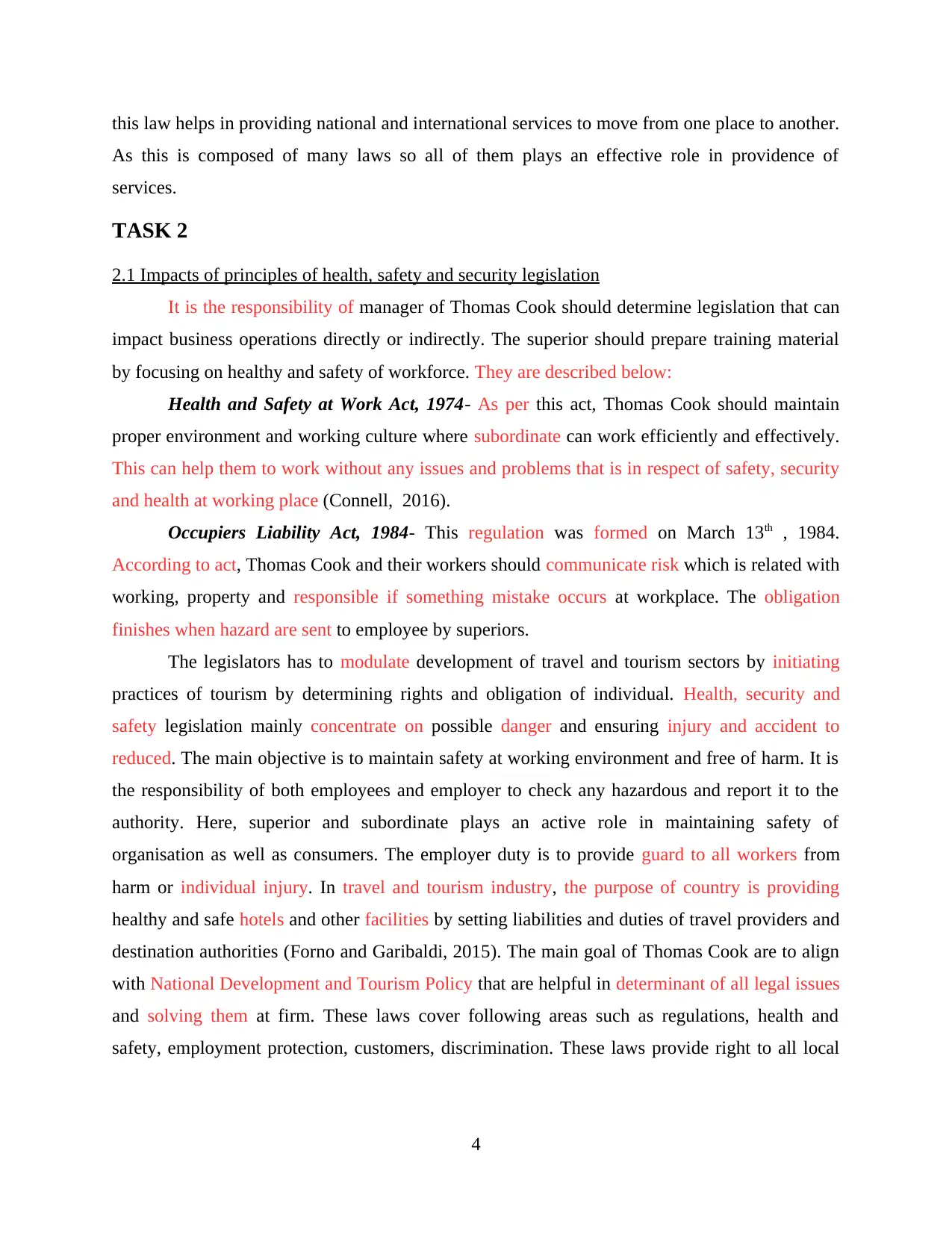
this law helps in providing national and international services to move from one place to another.
As this is composed of many laws so all of them plays an effective role in providence of
services.
TASK 2
2.1 Impacts of principles of health, safety and security legislation
It is the responsibility of manager of Thomas Cook should determine legislation that can
impact business operations directly or indirectly. The superior should prepare training material
by focusing on healthy and safety of workforce. They are described below:
Health and Safety at Work Act, 1974- As per this act, Thomas Cook should maintain
proper environment and working culture where subordinate can work efficiently and effectively.
This can help them to work without any issues and problems that is in respect of safety, security
and health at working place (Connell, 2016).
Occupiers Liability Act, 1984- This regulation was formed on March 13th , 1984.
According to act, Thomas Cook and their workers should communicate risk which is related with
working, property and responsible if something mistake occurs at workplace. The obligation
finishes when hazard are sent to employee by superiors.
The legislators has to modulate development of travel and tourism sectors by initiating
practices of tourism by determining rights and obligation of individual. Health, security and
safety legislation mainly concentrate on possible danger and ensuring injury and accident to
reduced. The main objective is to maintain safety at working environment and free of harm. It is
the responsibility of both employees and employer to check any hazardous and report it to the
authority. Here, superior and subordinate plays an active role in maintaining safety of
organisation as well as consumers. The employer duty is to provide guard to all workers from
harm or individual injury. In travel and tourism industry, the purpose of country is providing
healthy and safe hotels and other facilities by setting liabilities and duties of travel providers and
destination authorities (Forno and Garibaldi, 2015). The main goal of Thomas Cook are to align
with National Development and Tourism Policy that are helpful in determinant of all legal issues
and solving them at firm. These laws cover following areas such as regulations, health and
safety, employment protection, customers, discrimination. These laws provide right to all local
4
As this is composed of many laws so all of them plays an effective role in providence of
services.
TASK 2
2.1 Impacts of principles of health, safety and security legislation
It is the responsibility of manager of Thomas Cook should determine legislation that can
impact business operations directly or indirectly. The superior should prepare training material
by focusing on healthy and safety of workforce. They are described below:
Health and Safety at Work Act, 1974- As per this act, Thomas Cook should maintain
proper environment and working culture where subordinate can work efficiently and effectively.
This can help them to work without any issues and problems that is in respect of safety, security
and health at working place (Connell, 2016).
Occupiers Liability Act, 1984- This regulation was formed on March 13th , 1984.
According to act, Thomas Cook and their workers should communicate risk which is related with
working, property and responsible if something mistake occurs at workplace. The obligation
finishes when hazard are sent to employee by superiors.
The legislators has to modulate development of travel and tourism sectors by initiating
practices of tourism by determining rights and obligation of individual. Health, security and
safety legislation mainly concentrate on possible danger and ensuring injury and accident to
reduced. The main objective is to maintain safety at working environment and free of harm. It is
the responsibility of both employees and employer to check any hazardous and report it to the
authority. Here, superior and subordinate plays an active role in maintaining safety of
organisation as well as consumers. The employer duty is to provide guard to all workers from
harm or individual injury. In travel and tourism industry, the purpose of country is providing
healthy and safe hotels and other facilities by setting liabilities and duties of travel providers and
destination authorities (Forno and Garibaldi, 2015). The main goal of Thomas Cook are to align
with National Development and Tourism Policy that are helpful in determinant of all legal issues
and solving them at firm. These laws cover following areas such as regulations, health and
safety, employment protection, customers, discrimination. These laws provide right to all local
4
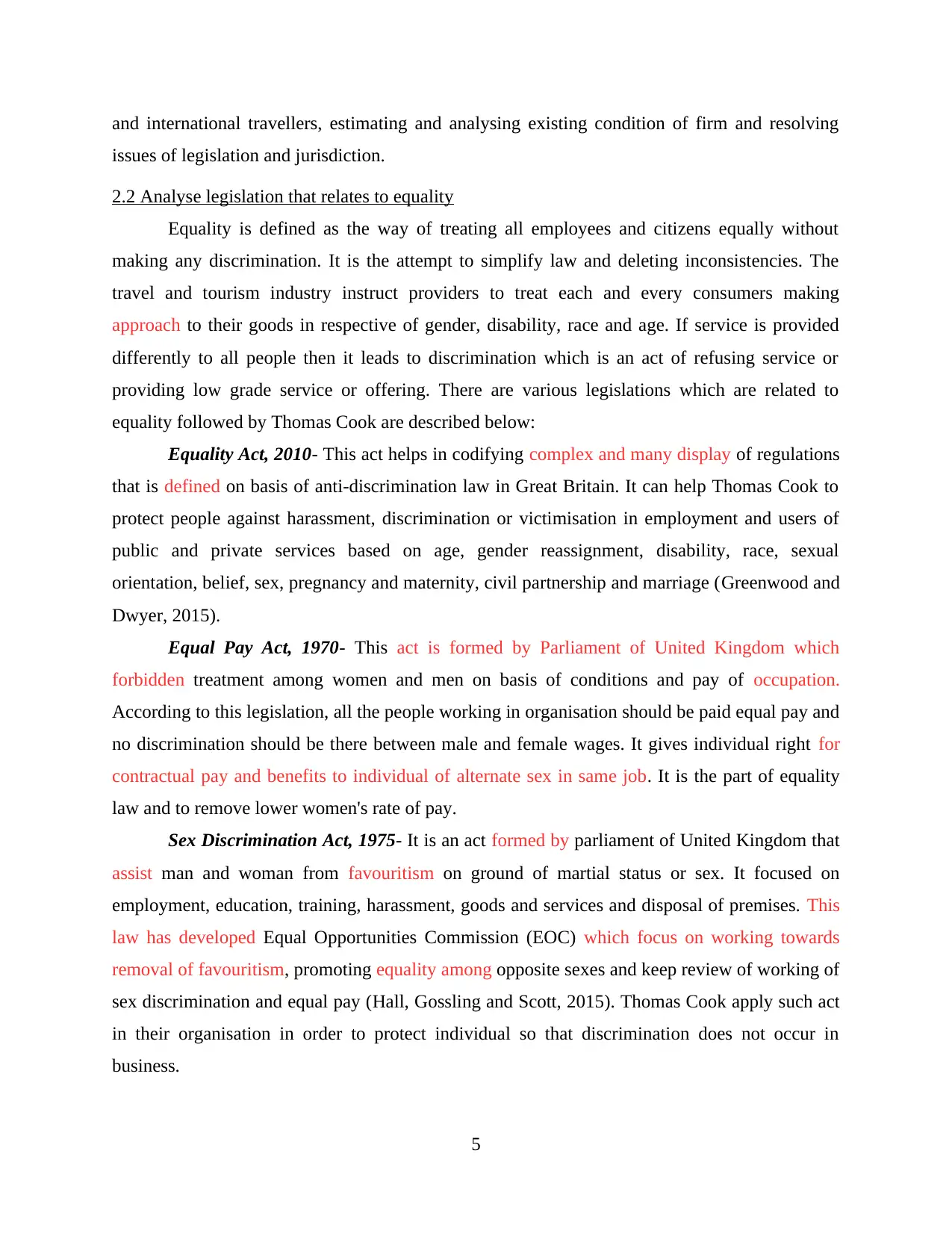
and international travellers, estimating and analysing existing condition of firm and resolving
issues of legislation and jurisdiction.
2.2 Analyse legislation that relates to equality
Equality is defined as the way of treating all employees and citizens equally without
making any discrimination. It is the attempt to simplify law and deleting inconsistencies. The
travel and tourism industry instruct providers to treat each and every consumers making
approach to their goods in respective of gender, disability, race and age. If service is provided
differently to all people then it leads to discrimination which is an act of refusing service or
providing low grade service or offering. There are various legislations which are related to
equality followed by Thomas Cook are described below:
Equality Act, 2010- This act helps in codifying complex and many display of regulations
that is defined on basis of anti-discrimination law in Great Britain. It can help Thomas Cook to
protect people against harassment, discrimination or victimisation in employment and users of
public and private services based on age, gender reassignment, disability, race, sexual
orientation, belief, sex, pregnancy and maternity, civil partnership and marriage (Greenwood and
Dwyer, 2015).
Equal Pay Act, 1970- This act is formed by Parliament of United Kingdom which
forbidden treatment among women and men on basis of conditions and pay of occupation.
According to this legislation, all the people working in organisation should be paid equal pay and
no discrimination should be there between male and female wages. It gives individual right for
contractual pay and benefits to individual of alternate sex in same job. It is the part of equality
law and to remove lower women's rate of pay.
Sex Discrimination Act, 1975- It is an act formed by parliament of United Kingdom that
assist man and woman from favouritism on ground of martial status or sex. It focused on
employment, education, training, harassment, goods and services and disposal of premises. This
law has developed Equal Opportunities Commission (EOC) which focus on working towards
removal of favouritism, promoting equality among opposite sexes and keep review of working of
sex discrimination and equal pay (Hall, Gossling and Scott, 2015). Thomas Cook apply such act
in their organisation in order to protect individual so that discrimination does not occur in
business.
5
issues of legislation and jurisdiction.
2.2 Analyse legislation that relates to equality
Equality is defined as the way of treating all employees and citizens equally without
making any discrimination. It is the attempt to simplify law and deleting inconsistencies. The
travel and tourism industry instruct providers to treat each and every consumers making
approach to their goods in respective of gender, disability, race and age. If service is provided
differently to all people then it leads to discrimination which is an act of refusing service or
providing low grade service or offering. There are various legislations which are related to
equality followed by Thomas Cook are described below:
Equality Act, 2010- This act helps in codifying complex and many display of regulations
that is defined on basis of anti-discrimination law in Great Britain. It can help Thomas Cook to
protect people against harassment, discrimination or victimisation in employment and users of
public and private services based on age, gender reassignment, disability, race, sexual
orientation, belief, sex, pregnancy and maternity, civil partnership and marriage (Greenwood and
Dwyer, 2015).
Equal Pay Act, 1970- This act is formed by Parliament of United Kingdom which
forbidden treatment among women and men on basis of conditions and pay of occupation.
According to this legislation, all the people working in organisation should be paid equal pay and
no discrimination should be there between male and female wages. It gives individual right for
contractual pay and benefits to individual of alternate sex in same job. It is the part of equality
law and to remove lower women's rate of pay.
Sex Discrimination Act, 1975- It is an act formed by parliament of United Kingdom that
assist man and woman from favouritism on ground of martial status or sex. It focused on
employment, education, training, harassment, goods and services and disposal of premises. This
law has developed Equal Opportunities Commission (EOC) which focus on working towards
removal of favouritism, promoting equality among opposite sexes and keep review of working of
sex discrimination and equal pay (Hall, Gossling and Scott, 2015). Thomas Cook apply such act
in their organisation in order to protect individual so that discrimination does not occur in
business.
5
Secure Best Marks with AI Grader
Need help grading? Try our AI Grader for instant feedback on your assignments.
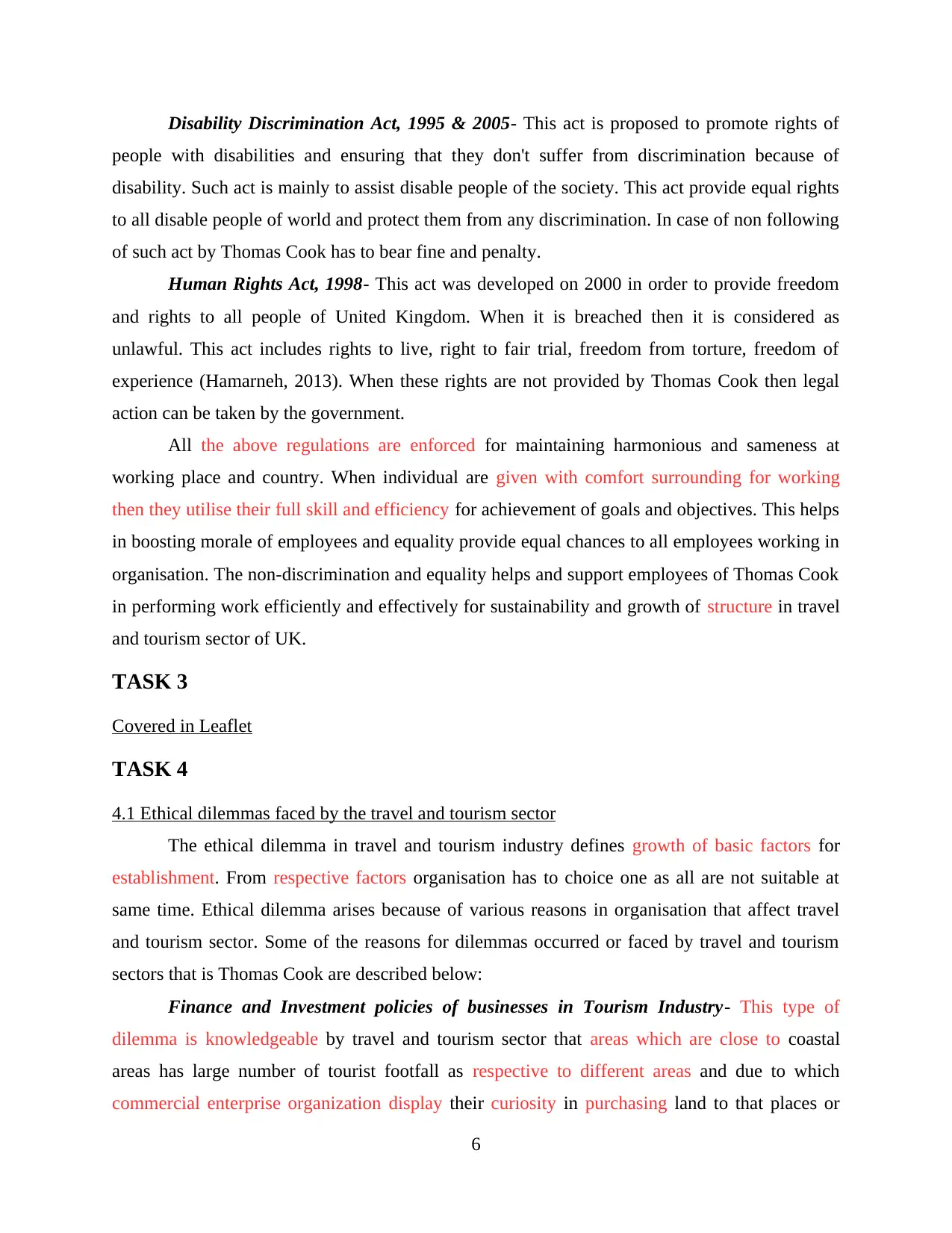
Disability Discrimination Act, 1995 & 2005- This act is proposed to promote rights of
people with disabilities and ensuring that they don't suffer from discrimination because of
disability. Such act is mainly to assist disable people of the society. This act provide equal rights
to all disable people of world and protect them from any discrimination. In case of non following
of such act by Thomas Cook has to bear fine and penalty.
Human Rights Act, 1998- This act was developed on 2000 in order to provide freedom
and rights to all people of United Kingdom. When it is breached then it is considered as
unlawful. This act includes rights to live, right to fair trial, freedom from torture, freedom of
experience (Hamarneh, 2013). When these rights are not provided by Thomas Cook then legal
action can be taken by the government.
All the above regulations are enforced for maintaining harmonious and sameness at
working place and country. When individual are given with comfort surrounding for working
then they utilise their full skill and efficiency for achievement of goals and objectives. This helps
in boosting morale of employees and equality provide equal chances to all employees working in
organisation. The non-discrimination and equality helps and support employees of Thomas Cook
in performing work efficiently and effectively for sustainability and growth of structure in travel
and tourism sector of UK.
TASK 3
Covered in Leaflet
TASK 4
4.1 Ethical dilemmas faced by the travel and tourism sector
The ethical dilemma in travel and tourism industry defines growth of basic factors for
establishment. From respective factors organisation has to choice one as all are not suitable at
same time. Ethical dilemma arises because of various reasons in organisation that affect travel
and tourism sector. Some of the reasons for dilemmas occurred or faced by travel and tourism
sectors that is Thomas Cook are described below:
Finance and Investment policies of businesses in Tourism Industry- This type of
dilemma is knowledgeable by travel and tourism sector that areas which are close to coastal
areas has large number of tourist footfall as respective to different areas and due to which
commercial enterprise organization display their curiosity in purchasing land to that places or
6
people with disabilities and ensuring that they don't suffer from discrimination because of
disability. Such act is mainly to assist disable people of the society. This act provide equal rights
to all disable people of world and protect them from any discrimination. In case of non following
of such act by Thomas Cook has to bear fine and penalty.
Human Rights Act, 1998- This act was developed on 2000 in order to provide freedom
and rights to all people of United Kingdom. When it is breached then it is considered as
unlawful. This act includes rights to live, right to fair trial, freedom from torture, freedom of
experience (Hamarneh, 2013). When these rights are not provided by Thomas Cook then legal
action can be taken by the government.
All the above regulations are enforced for maintaining harmonious and sameness at
working place and country. When individual are given with comfort surrounding for working
then they utilise their full skill and efficiency for achievement of goals and objectives. This helps
in boosting morale of employees and equality provide equal chances to all employees working in
organisation. The non-discrimination and equality helps and support employees of Thomas Cook
in performing work efficiently and effectively for sustainability and growth of structure in travel
and tourism sector of UK.
TASK 3
Covered in Leaflet
TASK 4
4.1 Ethical dilemmas faced by the travel and tourism sector
The ethical dilemma in travel and tourism industry defines growth of basic factors for
establishment. From respective factors organisation has to choice one as all are not suitable at
same time. Ethical dilemma arises because of various reasons in organisation that affect travel
and tourism sector. Some of the reasons for dilemmas occurred or faced by travel and tourism
sectors that is Thomas Cook are described below:
Finance and Investment policies of businesses in Tourism Industry- This type of
dilemma is knowledgeable by travel and tourism sector that areas which are close to coastal
areas has large number of tourist footfall as respective to different areas and due to which
commercial enterprise organization display their curiosity in purchasing land to that places or
6
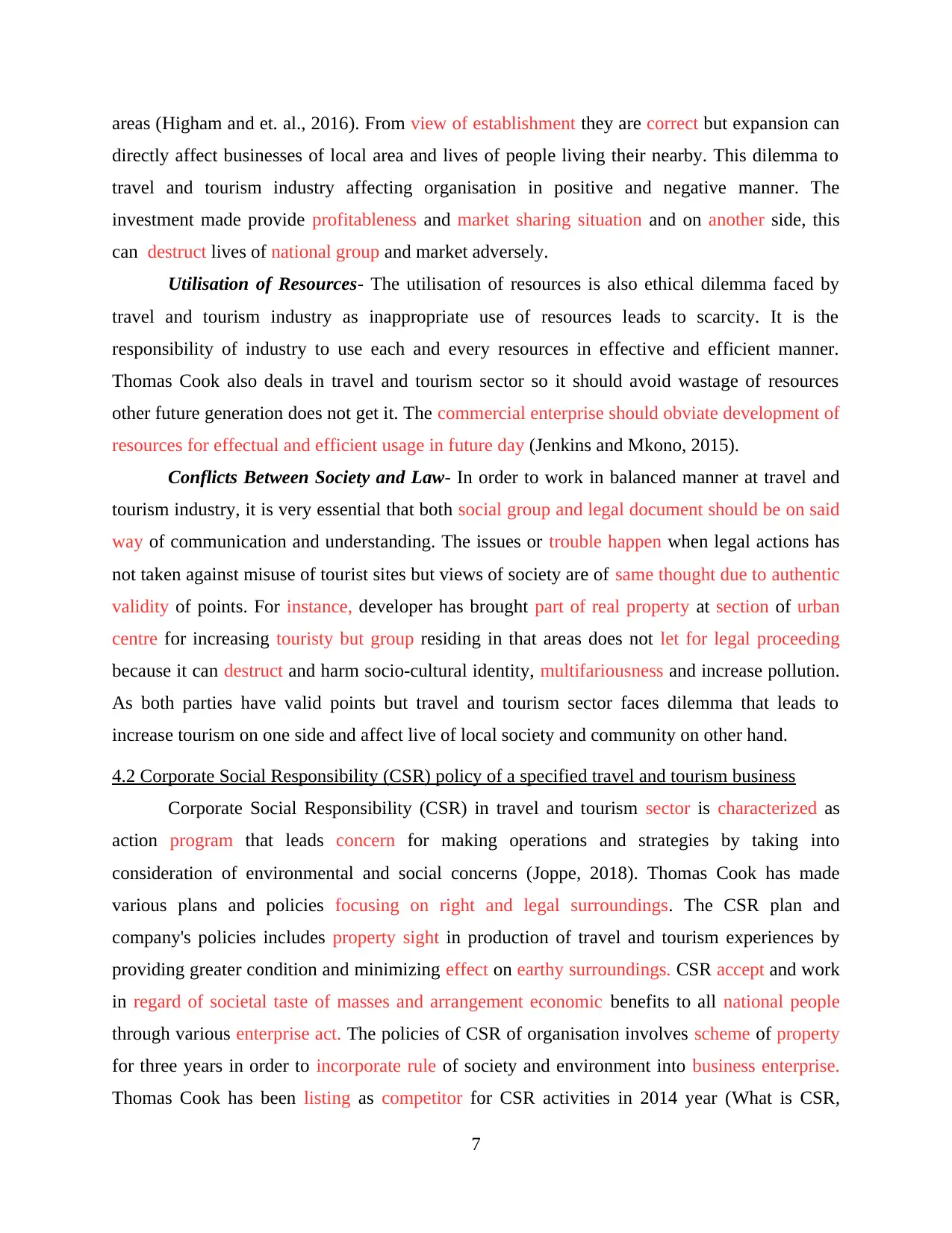
areas (Higham and et. al., 2016). From view of establishment they are correct but expansion can
directly affect businesses of local area and lives of people living their nearby. This dilemma to
travel and tourism industry affecting organisation in positive and negative manner. The
investment made provide profitableness and market sharing situation and on another side, this
can destruct lives of national group and market adversely.
Utilisation of Resources- The utilisation of resources is also ethical dilemma faced by
travel and tourism industry as inappropriate use of resources leads to scarcity. It is the
responsibility of industry to use each and every resources in effective and efficient manner.
Thomas Cook also deals in travel and tourism sector so it should avoid wastage of resources
other future generation does not get it. The commercial enterprise should obviate development of
resources for effectual and efficient usage in future day (Jenkins and Mkono, 2015).
Conflicts Between Society and Law- In order to work in balanced manner at travel and
tourism industry, it is very essential that both social group and legal document should be on said
way of communication and understanding. The issues or trouble happen when legal actions has
not taken against misuse of tourist sites but views of society are of same thought due to authentic
validity of points. For instance, developer has brought part of real property at section of urban
centre for increasing touristy but group residing in that areas does not let for legal proceeding
because it can destruct and harm socio-cultural identity, multifariousness and increase pollution.
As both parties have valid points but travel and tourism sector faces dilemma that leads to
increase tourism on one side and affect live of local society and community on other hand.
4.2 Corporate Social Responsibility (CSR) policy of a specified travel and tourism business
Corporate Social Responsibility (CSR) in travel and tourism sector is characterized as
action program that leads concern for making operations and strategies by taking into
consideration of environmental and social concerns (Joppe, 2018). Thomas Cook has made
various plans and policies focusing on right and legal surroundings. The CSR plan and
company's policies includes property sight in production of travel and tourism experiences by
providing greater condition and minimizing effect on earthy surroundings. CSR accept and work
in regard of societal taste of masses and arrangement economic benefits to all national people
through various enterprise act. The policies of CSR of organisation involves scheme of property
for three years in order to incorporate rule of society and environment into business enterprise.
Thomas Cook has been listing as competitor for CSR activities in 2014 year (What is CSR,
7
directly affect businesses of local area and lives of people living their nearby. This dilemma to
travel and tourism industry affecting organisation in positive and negative manner. The
investment made provide profitableness and market sharing situation and on another side, this
can destruct lives of national group and market adversely.
Utilisation of Resources- The utilisation of resources is also ethical dilemma faced by
travel and tourism industry as inappropriate use of resources leads to scarcity. It is the
responsibility of industry to use each and every resources in effective and efficient manner.
Thomas Cook also deals in travel and tourism sector so it should avoid wastage of resources
other future generation does not get it. The commercial enterprise should obviate development of
resources for effectual and efficient usage in future day (Jenkins and Mkono, 2015).
Conflicts Between Society and Law- In order to work in balanced manner at travel and
tourism industry, it is very essential that both social group and legal document should be on said
way of communication and understanding. The issues or trouble happen when legal actions has
not taken against misuse of tourist sites but views of society are of same thought due to authentic
validity of points. For instance, developer has brought part of real property at section of urban
centre for increasing touristy but group residing in that areas does not let for legal proceeding
because it can destruct and harm socio-cultural identity, multifariousness and increase pollution.
As both parties have valid points but travel and tourism sector faces dilemma that leads to
increase tourism on one side and affect live of local society and community on other hand.
4.2 Corporate Social Responsibility (CSR) policy of a specified travel and tourism business
Corporate Social Responsibility (CSR) in travel and tourism sector is characterized as
action program that leads concern for making operations and strategies by taking into
consideration of environmental and social concerns (Joppe, 2018). Thomas Cook has made
various plans and policies focusing on right and legal surroundings. The CSR plan and
company's policies includes property sight in production of travel and tourism experiences by
providing greater condition and minimizing effect on earthy surroundings. CSR accept and work
in regard of societal taste of masses and arrangement economic benefits to all national people
through various enterprise act. The policies of CSR of organisation involves scheme of property
for three years in order to incorporate rule of society and environment into business enterprise.
Thomas Cook has been listing as competitor for CSR activities in 2014 year (What is CSR,
7
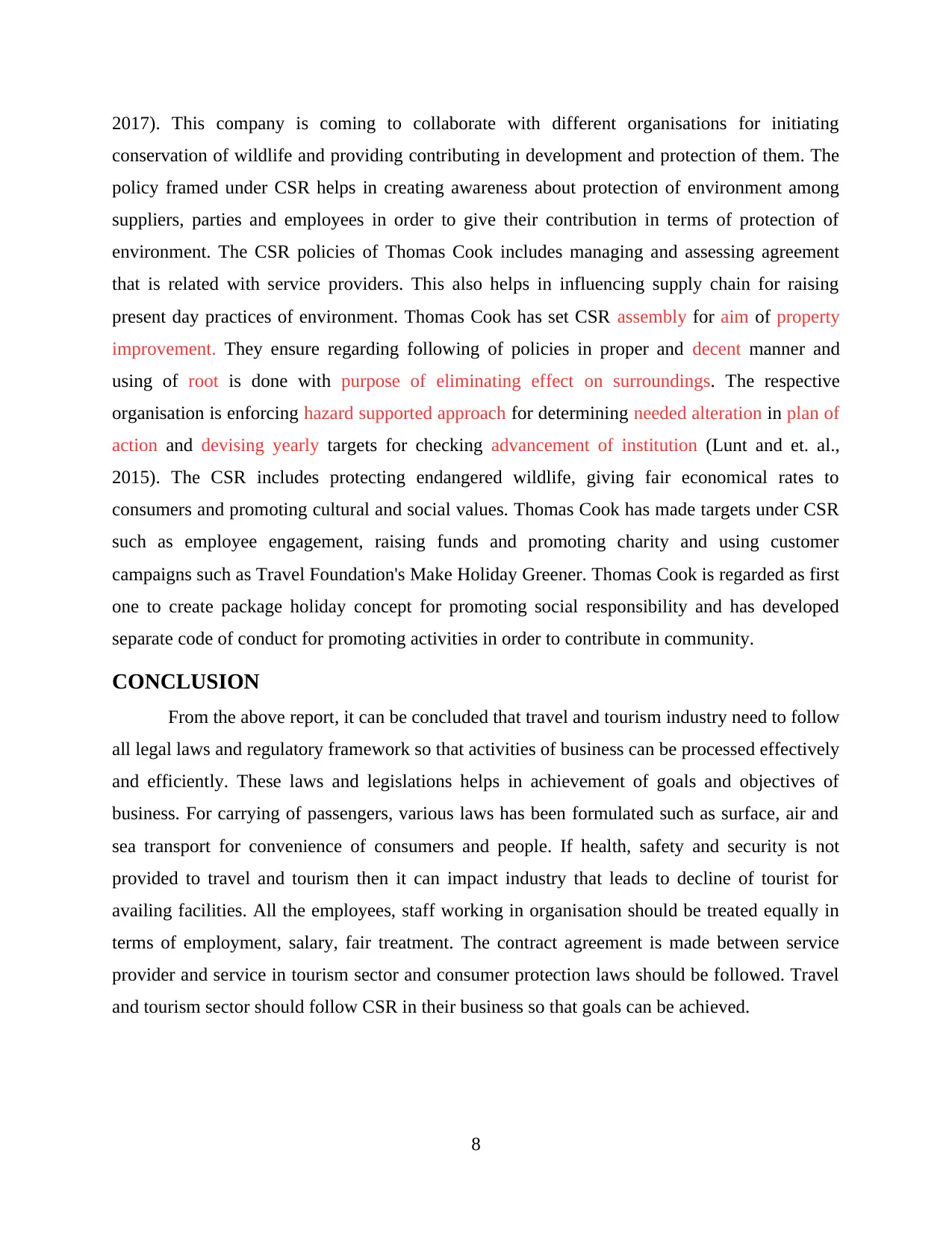
2017). This company is coming to collaborate with different organisations for initiating
conservation of wildlife and providing contributing in development and protection of them. The
policy framed under CSR helps in creating awareness about protection of environment among
suppliers, parties and employees in order to give their contribution in terms of protection of
environment. The CSR policies of Thomas Cook includes managing and assessing agreement
that is related with service providers. This also helps in influencing supply chain for raising
present day practices of environment. Thomas Cook has set CSR assembly for aim of property
improvement. They ensure regarding following of policies in proper and decent manner and
using of root is done with purpose of eliminating effect on surroundings. The respective
organisation is enforcing hazard supported approach for determining needed alteration in plan of
action and devising yearly targets for checking advancement of institution (Lunt and et. al.,
2015). The CSR includes protecting endangered wildlife, giving fair economical rates to
consumers and promoting cultural and social values. Thomas Cook has made targets under CSR
such as employee engagement, raising funds and promoting charity and using customer
campaigns such as Travel Foundation's Make Holiday Greener. Thomas Cook is regarded as first
one to create package holiday concept for promoting social responsibility and has developed
separate code of conduct for promoting activities in order to contribute in community.
CONCLUSION
From the above report, it can be concluded that travel and tourism industry need to follow
all legal laws and regulatory framework so that activities of business can be processed effectively
and efficiently. These laws and legislations helps in achievement of goals and objectives of
business. For carrying of passengers, various laws has been formulated such as surface, air and
sea transport for convenience of consumers and people. If health, safety and security is not
provided to travel and tourism then it can impact industry that leads to decline of tourist for
availing facilities. All the employees, staff working in organisation should be treated equally in
terms of employment, salary, fair treatment. The contract agreement is made between service
provider and service in tourism sector and consumer protection laws should be followed. Travel
and tourism sector should follow CSR in their business so that goals can be achieved.
8
conservation of wildlife and providing contributing in development and protection of them. The
policy framed under CSR helps in creating awareness about protection of environment among
suppliers, parties and employees in order to give their contribution in terms of protection of
environment. The CSR policies of Thomas Cook includes managing and assessing agreement
that is related with service providers. This also helps in influencing supply chain for raising
present day practices of environment. Thomas Cook has set CSR assembly for aim of property
improvement. They ensure regarding following of policies in proper and decent manner and
using of root is done with purpose of eliminating effect on surroundings. The respective
organisation is enforcing hazard supported approach for determining needed alteration in plan of
action and devising yearly targets for checking advancement of institution (Lunt and et. al.,
2015). The CSR includes protecting endangered wildlife, giving fair economical rates to
consumers and promoting cultural and social values. Thomas Cook has made targets under CSR
such as employee engagement, raising funds and promoting charity and using customer
campaigns such as Travel Foundation's Make Holiday Greener. Thomas Cook is regarded as first
one to create package holiday concept for promoting social responsibility and has developed
separate code of conduct for promoting activities in order to contribute in community.
CONCLUSION
From the above report, it can be concluded that travel and tourism industry need to follow
all legal laws and regulatory framework so that activities of business can be processed effectively
and efficiently. These laws and legislations helps in achievement of goals and objectives of
business. For carrying of passengers, various laws has been formulated such as surface, air and
sea transport for convenience of consumers and people. If health, safety and security is not
provided to travel and tourism then it can impact industry that leads to decline of tourist for
availing facilities. All the employees, staff working in organisation should be treated equally in
terms of employment, salary, fair treatment. The contract agreement is made between service
provider and service in tourism sector and consumer protection laws should be followed. Travel
and tourism sector should follow CSR in their business so that goals can be achieved.
8
Paraphrase This Document
Need a fresh take? Get an instant paraphrase of this document with our AI Paraphraser
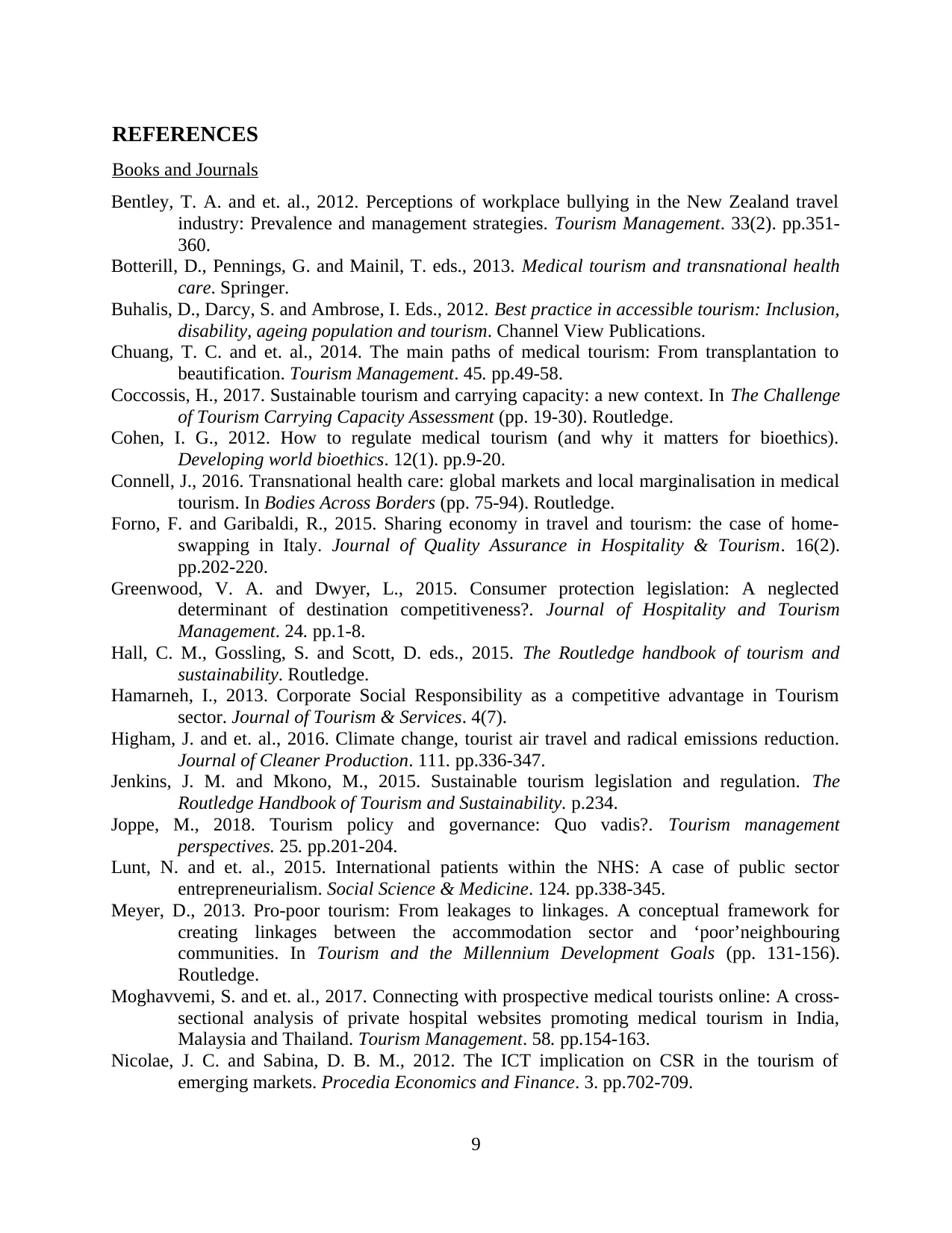
REFERENCES
Books and Journals
Bentley, T. A. and et. al., 2012. Perceptions of workplace bullying in the New Zealand travel
industry: Prevalence and management strategies. Tourism Management. 33(2). pp.351-
360.
Botterill, D., Pennings, G. and Mainil, T. eds., 2013. Medical tourism and transnational health
care. Springer.
Buhalis, D., Darcy, S. and Ambrose, I. Eds., 2012. Best practice in accessible tourism: Inclusion,
disability, ageing population and tourism. Channel View Publications.
Chuang, T. C. and et. al., 2014. The main paths of medical tourism: From transplantation to
beautification. Tourism Management. 45. pp.49-58.
Coccossis, H., 2017. Sustainable tourism and carrying capacity: a new context. In The Challenge
of Tourism Carrying Capacity Assessment (pp. 19-30). Routledge.
Cohen, I. G., 2012. How to regulate medical tourism (and why it matters for bioethics).
Developing world bioethics. 12(1). pp.9-20.
Connell, J., 2016. Transnational health care: global markets and local marginalisation in medical
tourism. In Bodies Across Borders (pp. 75-94). Routledge.
Forno, F. and Garibaldi, R., 2015. Sharing economy in travel and tourism: the case of home-
swapping in Italy. Journal of Quality Assurance in Hospitality & Tourism. 16(2).
pp.202-220.
Greenwood, V. A. and Dwyer, L., 2015. Consumer protection legislation: A neglected
determinant of destination competitiveness?. Journal of Hospitality and Tourism
Management. 24. pp.1-8.
Hall, C. M., Gossling, S. and Scott, D. eds., 2015. The Routledge handbook of tourism and
sustainability. Routledge.
Hamarneh, I., 2013. Corporate Social Responsibility as a competitive advantage in Tourism
sector. Journal of Tourism & Services. 4(7).
Higham, J. and et. al., 2016. Climate change, tourist air travel and radical emissions reduction.
Journal of Cleaner Production. 111. pp.336-347.
Jenkins, J. M. and Mkono, M., 2015. Sustainable tourism legislation and regulation. The
Routledge Handbook of Tourism and Sustainability. p.234.
Joppe, M., 2018. Tourism policy and governance: Quo vadis?. Tourism management
perspectives. 25. pp.201-204.
Lunt, N. and et. al., 2015. International patients within the NHS: A case of public sector
entrepreneurialism. Social Science & Medicine. 124. pp.338-345.
Meyer, D., 2013. Pro-poor tourism: From leakages to linkages. A conceptual framework for
creating linkages between the accommodation sector and ‘poor’neighbouring
communities. In Tourism and the Millennium Development Goals (pp. 131-156).
Routledge.
Moghavvemi, S. and et. al., 2017. Connecting with prospective medical tourists online: A cross-
sectional analysis of private hospital websites promoting medical tourism in India,
Malaysia and Thailand. Tourism Management. 58. pp.154-163.
Nicolae, J. C. and Sabina, D. B. M., 2012. The ICT implication on CSR in the tourism of
emerging markets. Procedia Economics and Finance. 3. pp.702-709.
9
Books and Journals
Bentley, T. A. and et. al., 2012. Perceptions of workplace bullying in the New Zealand travel
industry: Prevalence and management strategies. Tourism Management. 33(2). pp.351-
360.
Botterill, D., Pennings, G. and Mainil, T. eds., 2013. Medical tourism and transnational health
care. Springer.
Buhalis, D., Darcy, S. and Ambrose, I. Eds., 2012. Best practice in accessible tourism: Inclusion,
disability, ageing population and tourism. Channel View Publications.
Chuang, T. C. and et. al., 2014. The main paths of medical tourism: From transplantation to
beautification. Tourism Management. 45. pp.49-58.
Coccossis, H., 2017. Sustainable tourism and carrying capacity: a new context. In The Challenge
of Tourism Carrying Capacity Assessment (pp. 19-30). Routledge.
Cohen, I. G., 2012. How to regulate medical tourism (and why it matters for bioethics).
Developing world bioethics. 12(1). pp.9-20.
Connell, J., 2016. Transnational health care: global markets and local marginalisation in medical
tourism. In Bodies Across Borders (pp. 75-94). Routledge.
Forno, F. and Garibaldi, R., 2015. Sharing economy in travel and tourism: the case of home-
swapping in Italy. Journal of Quality Assurance in Hospitality & Tourism. 16(2).
pp.202-220.
Greenwood, V. A. and Dwyer, L., 2015. Consumer protection legislation: A neglected
determinant of destination competitiveness?. Journal of Hospitality and Tourism
Management. 24. pp.1-8.
Hall, C. M., Gossling, S. and Scott, D. eds., 2015. The Routledge handbook of tourism and
sustainability. Routledge.
Hamarneh, I., 2013. Corporate Social Responsibility as a competitive advantage in Tourism
sector. Journal of Tourism & Services. 4(7).
Higham, J. and et. al., 2016. Climate change, tourist air travel and radical emissions reduction.
Journal of Cleaner Production. 111. pp.336-347.
Jenkins, J. M. and Mkono, M., 2015. Sustainable tourism legislation and regulation. The
Routledge Handbook of Tourism and Sustainability. p.234.
Joppe, M., 2018. Tourism policy and governance: Quo vadis?. Tourism management
perspectives. 25. pp.201-204.
Lunt, N. and et. al., 2015. International patients within the NHS: A case of public sector
entrepreneurialism. Social Science & Medicine. 124. pp.338-345.
Meyer, D., 2013. Pro-poor tourism: From leakages to linkages. A conceptual framework for
creating linkages between the accommodation sector and ‘poor’neighbouring
communities. In Tourism and the Millennium Development Goals (pp. 131-156).
Routledge.
Moghavvemi, S. and et. al., 2017. Connecting with prospective medical tourists online: A cross-
sectional analysis of private hospital websites promoting medical tourism in India,
Malaysia and Thailand. Tourism Management. 58. pp.154-163.
Nicolae, J. C. and Sabina, D. B. M., 2012. The ICT implication on CSR in the tourism of
emerging markets. Procedia Economics and Finance. 3. pp.702-709.
9
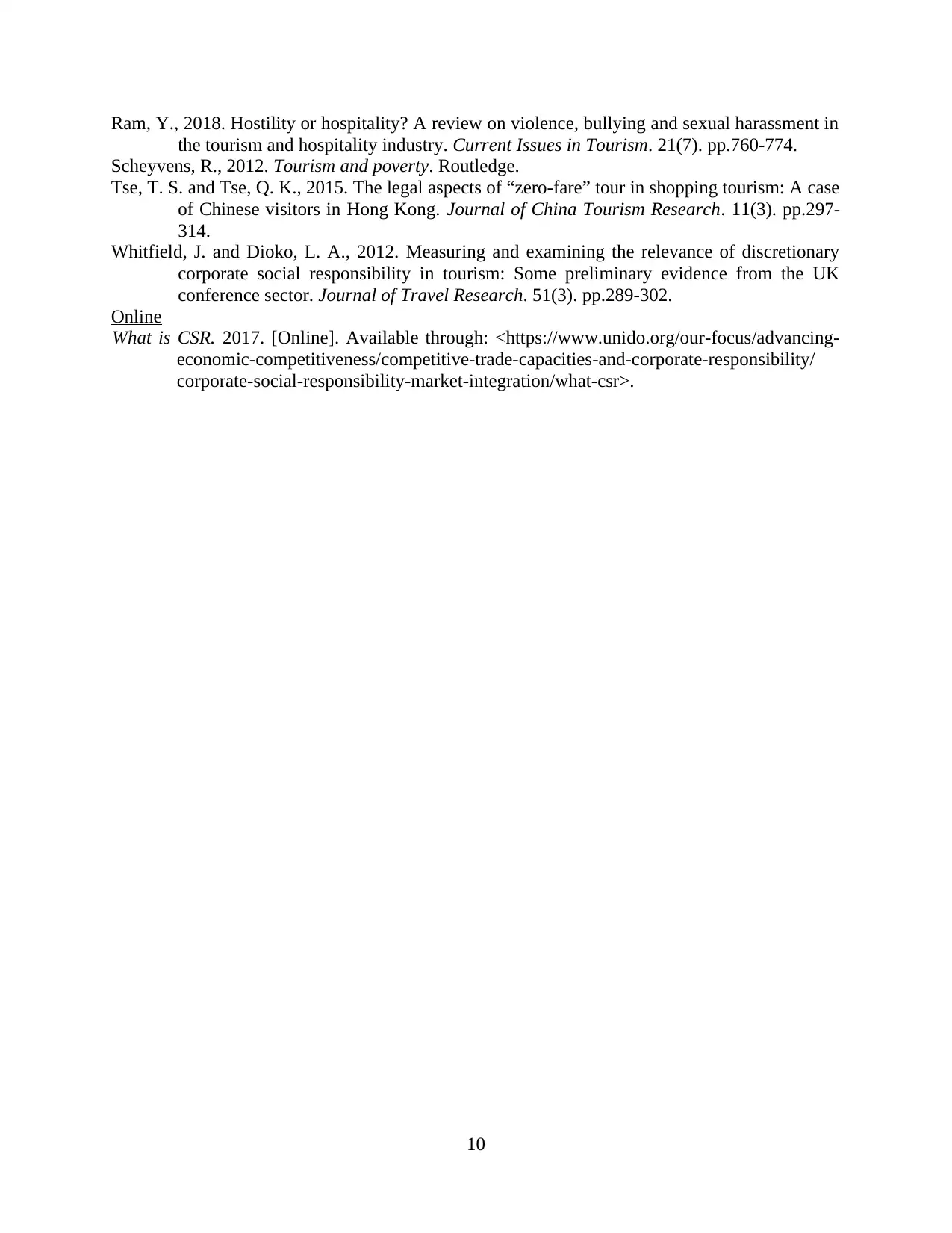
Ram, Y., 2018. Hostility or hospitality? A review on violence, bullying and sexual harassment in
the tourism and hospitality industry. Current Issues in Tourism. 21(7). pp.760-774.
Scheyvens, R., 2012. Tourism and poverty. Routledge.
Tse, T. S. and Tse, Q. K., 2015. The legal aspects of “zero-fare” tour in shopping tourism: A case
of Chinese visitors in Hong Kong. Journal of China Tourism Research. 11(3). pp.297-
314.
Whitfield, J. and Dioko, L. A., 2012. Measuring and examining the relevance of discretionary
corporate social responsibility in tourism: Some preliminary evidence from the UK
conference sector. Journal of Travel Research. 51(3). pp.289-302.
Online
What is CSR. 2017. [Online]. Available through: <https://www.unido.org/our-focus/advancing-
economic-competitiveness/competitive-trade-capacities-and-corporate-responsibility/
corporate-social-responsibility-market-integration/what-csr>.
10
the tourism and hospitality industry. Current Issues in Tourism. 21(7). pp.760-774.
Scheyvens, R., 2012. Tourism and poverty. Routledge.
Tse, T. S. and Tse, Q. K., 2015. The legal aspects of “zero-fare” tour in shopping tourism: A case
of Chinese visitors in Hong Kong. Journal of China Tourism Research. 11(3). pp.297-
314.
Whitfield, J. and Dioko, L. A., 2012. Measuring and examining the relevance of discretionary
corporate social responsibility in tourism: Some preliminary evidence from the UK
conference sector. Journal of Travel Research. 51(3). pp.289-302.
Online
What is CSR. 2017. [Online]. Available through: <https://www.unido.org/our-focus/advancing-
economic-competitiveness/competitive-trade-capacities-and-corporate-responsibility/
corporate-social-responsibility-market-integration/what-csr>.
10
1 out of 12
![[object Object]](/_next/static/media/star-bottom.7253800d.svg)





